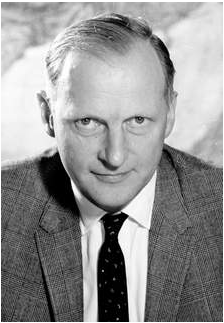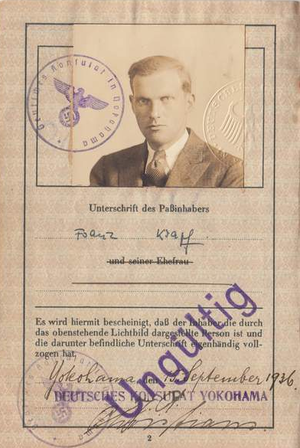Franz Krapf
(diplomat, spook) | ||||||||||||
|---|---|---|---|---|---|---|---|---|---|---|---|---|
 Krapf age 54 as a high-ranking West German diplomat. | ||||||||||||
| Born | 22 July 1911 Munich, Germany | |||||||||||
| Died | 23 October 2004 (Age 93) Bonn, Germany | |||||||||||
| Nationality | German | |||||||||||
| Alma mater | Ludwig Maximilians University, Friedrich Wilhelm University, Amherst College, Imperial University of Tokyo | |||||||||||
| Party | NSDAP | |||||||||||
German spooky diplomat. SS Reich Security Main Office and Japan expert during WW2. After fixing a "clean bill of health" in denazification process, he became high-ranking West German diplomat, Permanent Representative to NATO and Ambassador to Japan. Attended the 1964 Bilderberg conference.
| ||||||||||||
Franz Krapf was a German diplomat and spook. Before and during World War 2 he was both a diplomat and attached to the security services, the Reich Security Main Office. After the war, he managed to receive a "clean bill of health" and continued his career. He participated in the negotiations for the Schuman-Plan, the beginning of what later became the European Union, and later became Ambassador to Japan and German Permanent Representative to NATO. He attended the the 1964 Bilderberg conference as a high-ranking diplomat.
Education
After school, Krapf studied political science at the Ludwig Maximilians University in Munich, the Friedrich Wilhelm University in Berlin and Amherst College in Massachusetts. In 1935 he completed his state examination at the Ludwig Maximilian University. He then studied the Japanese language at the Seminar for Oriental Languages at the Friedrich-Wilhelms-University and then from 1935 to 1937 with a scholarship Japanese language and law at the Imperial University of Tokyo. After his return in 1937, he received his diploma at the Seminar for Oriental Languages.
Career
According to Krapf's own statements in August 1950, he became a member of the equestrian "SA/SS-Reitersturm Charlottenburg" in 1933 and a member of the NSDAP in 1936 (membership number 3,726,653).[1] A well-known member of the Reiter-SS was Bernhard zur Lippe-Biesterfeld, who set up the Bilderberg conferences.
In reality, Krapf was accepted into the Allgemeine SS in May 1933 under membership number 102,283, and was promoted to SS Untersturmfuhrer in the Reich Security Main Office (the central authority in the state repressive apparatus) on February 1, 1938, not in the more general SS Main Office, as Krapf had also stated in August 1950. As late as May 1944, the head of the Security Police informed the SS Personnel Main Office that Krapf, along with four other members of the Foreign Office, was a volunteer at the Reich Security Main Office and called upon to cooperate on an ongoing basis.[1]
On February 1, 1938, he entered the diplomatic service of the Foreign Office and worked first at the embassy in Egypt and then in the Soviet Union. During the Second World War he worked from 1940 to 1945 as Secretary of the Legation in the Embassy in Japan. After the war he worked as a merchant, first in Germany and Sweden and then from 1948 to 1950 in Japan.
In a denazification process before a tribunal in May 1948, Krapf was nevertheless classified in the group of "exonerated".[2][3]
After the founding of the Federal Republic of Germany (West Germany), he returned in 1950 and became a consultant for America in the Federal Government's Press and Information Office. In this capacity he took part in the negotiations on the Schuman Plan in Paris in May 1950 as a member of the German delegation. In early 1951 he became a staff member in the newly established Foreign Office and shortly afterwards to the Consul General in Paris, Wilhelm Hausenstein.
Later he worked at the embassy in Washington and until 1966 head of the Eastern Department at the Foreign Office.
In 1966 he was appointed ambassador to Japan.
After five years in Tokyo , he became Ambassador and Permanent Representative to NATO in 1971 in Brussels. He held this office until his retirement in 1976. Rolf Friedemann Pauls became his successor as Permanent Representative.
After his death, an ongoing controversy about how to come to terms with the past ignited in the Federal Foreign Office because Federal Foreign Minister Joschka Fischer and Franz Krapf for the first time refused to honor a deceased ambassador with a NSDAP and SS past in an internal newsletter and “thus broke through decades of commemorative practice."[4][5][6] Instead of the incumbent Foreign Minister, former minister Hans-Dietrich Genscher held the funeral address in the Bonn.</ref>http://www.freitag.de/autoren/der-freitag/das-ende-meiner-amtszeit</ref>
However, a statement by Erich Kordt on October 10, 1947, put Krapf close to the resistance against Hitler. The daily newspaper Die Welt described this document from 1947 as "a document that could then be used as a clean bill of health ", but the "descriptions contained therein" need not be "false".[7]
Event Participated in
| Event | Start | End | Location(s) | Description |
|---|---|---|---|---|
| Bilderberg/1964 | 20 March 1964 | 22 March 1964 | US Virginia Williamsburg | A year after this meeting, the post of GATT/Director-General was set up, and given Eric Wyndham White, who attended the '64 meeting. Several subsequent holders have been Bilderberg insiders, only 2 are not known to have attended the group. |
References
- ↑ a b Hans-Jürgen Döscher: Seilschaften. Die verdrängte Vergangenheit des Auswärtigen Amtes. Propyläen, Berlin 2005, pages 82–86, here page 84
- ↑ In: Antifaschistisches Infoblatt. Nr. 68, 4/2005, S. 44–47; Hans-Jürgen Döscher: Seilschaften. Die verdrängte Vergangenheit des Auswärtigen Amtes. Propyläen, Berlin 2005, S. 83
- ↑ https://www.antifainfoblatt.de/artikel/korpsgeist-und-kontinuit%C3%A4ten
- ↑ Hans-Jürgen Döscher: Seilschaften. Die verdrängte Vergangenheit des Auswärtigen Amtes. Propyläen, Berlin 2005, S. 11 f.
- ↑ http://www.tagesspiegel.de/zeitung/die-schlingpflanze/607790.html
- ↑ http://www.faz.net/aktuell/politik/inland/auswaertige-amt-fischers-gedenkpraxis-1208733.html
- ↑ https://www.welt.de/print-welt/article650944/Der-Botschafter-Franz-Krapf-rueckt-in-neues-Licht.html
